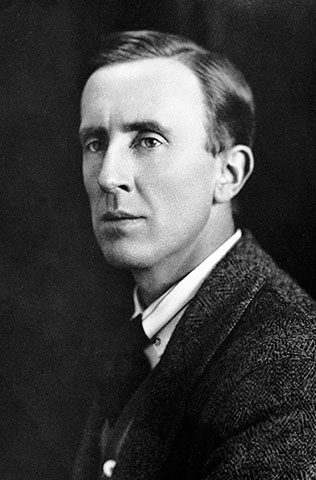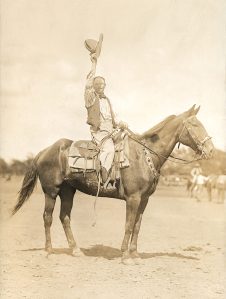Marc De Santis celebrates some of the pivotal literary figures who experienced the carnage of World War I.
Clive Staples (C. S.) Lewis 1898–1963
Lewis served in the British Army on the Western Front, where he was wounded during Germany’s massive spring offensive in 1918. Born in Ireland, Lewis was a fervent Christian and his faith is reflected in his writings. Among his most famous works are Surprised by Joy, Mere Christianity, and the children’s series The Chronicles of Narnia. While teaching at Oxford, Lewis became a member of the informal literary group known as the Inklings and a close friend of fellow member J. R. R. Tolkien.
John Ronald Reuel (J. R. R.) Tolkien 1892–1973
As a second lieutenant with the 11th Lancashire Fusiliers, Tolkien took part in the Battle of the Somme. While recovering from an illness contracted in the trenches, he started writing tales of elves and men, and his resulting Middle-earth fantasies, The Hobbit and The Lord of the Rings, made him a world literary celebrity. The devoutly Catholic Tolkien was a professor of Old English at Oxford for much of his life and incorporated his deep love of languages into his mythical world.
Ernest Hemingway 1899–1961
The American novelist served as a volunteer ambulance driver with the Italian army in the First World War. In 1918 he was severely wounded by Austrian mortar shells but nonetheless managed to save the life of an Italian soldier, for which he was awarded the Silver Medal of Military Valor. His literary masterpieces include two iconic war novels, A Farewell to Arms and For Whom the Bell Tolls. He was awarded the 1954 Nobel Prize in Literature.
Robert Graves 1895–1985
As a junior officer in the Royal Welch Fusiliers at the Battle of the Somme, Graves suffered a shrapnel wound so severe that he was officially listed as dead. He survived and went on to write Good-Bye to All That, a war memoir; a biography of his friend T. E. Lawrence; and the historical novels I, Claudius and Claudius the God, which were adapted for a 1976 BBC television series. His examinations of mythology, The White Goddess and The Greek Myths, expounded his theory that the ancient religion of Europe centered on a great mother goddess. Graves was a close friend of another English officer and poet in his regiment, Siegfried Sassoon.
Wilfred Owen 1893–1918
A second lieutenant with the 2nd Manchesters and also a friend of Sassoon, Owen was awarded a Military Cross for heroism in capturing a German machine-gun position in October 1918. A month later he died in battle in France just one week before the armistice ended the war. Owen is thought by many to be the foremost poet of the Great War. His poems “Strange Meeting” and “Dulce et Decorum Est” convey the unremitting horror of trench warfare.
Siegfried Sassoon 1886–1967
Sassoon saw extensive combat on the Western Front. Nicknamed “Mad Jack” for his extraordinary bravery, he was awarded the Military Cross in 1916 for his actions in rescuing men from no man’s land after a botched raid. Sassoon was horrified by the carnage he saw in the trenches, and his acclaimed poetry and other writing reflects his disenchantment. In 1917 he wrote a short antiwar statement—“Finished with the War: A Soldier’s Declaration”—that was read aloud in Parliament. Fortunately for Sassoon, instead of a court-martial, he was treated for shell shock at Craiglockhart War Hospital in Scotland, where he met Wilfred Owen. Sassoon’s semifictional Memoirs of an Infantry Officer is based in part on his war experiences.
Erich Maria Remarque 1898–1970
This German author, wounded by shrapnel on the Western Front, brought the experience of a German soldier in World War I vividly to life in his classic, All Quiet on the Western Front. Written in 1929, it was made into an Oscar-winning Hollywood movie the following year. The Nazis hated Remarque, burned his books, and stripped him of his citizenship. In 1939 he left Germany for the United States, where he wrote his second bestseller, Arch of Triumph, also adapted for film. In 1947 Remarque became a naturalized American citizen but left for Switzerland the following year and spent the remainder of his life there, continuing to write novels.
Pierre Teilhard de Chardin 1881–1955
Teilhard de Chardin was a French Jesuit priest who served as a stretcher-bearer with the 8th Moroccan Rifles, a French North African colonial regiment. He saw action at Ypres and Verdun and for his bravery was awarded the Military Medal, and later, the Legion of Honor, France’s highest decoration. He had a lifelong interest in paleontology and helped discover the skull of Peking Man. Today, he is best known as a philosopher, whose striking conceptions of material and spiritual evolution were set forth in a number of books, including The Phenomenon of Man. He believed humanity would culminate in the Omega Point, the cosmic aspect of Jesus Christ.
Winston Churchill 1874–1965
The grandson of the Duke of Marlborough, Churchill held the civilian position of First Lord of the Admiralty at the outbreak of World War I. He was then one of the few men in the British government to possess military experience, having served in India, Sudan, and South Africa. Unfortunately, he was instrumental in bringing about the disastrous 1915 Gallipoli operation and, blamed for its failure, resigned from his position. Dejected, he took up the command of the 6th Battalion, Royal Scots Fusiliers, in Flanders for several months, serving with the rank of lieutenant colonel. Churchill was an exceptionally prolific author. His works include The Story of the Malakand Field Force, about his military service on India’s North-West Frontier; The River War, describing his experiences with Earl Kitchener’s forces fighting to take back Sudan; The World Crisis, a six-volume history of the First World War; the monumental Second World War; and the four-volume History of the English-Speaking Peoples. He was awarded the Nobel Prize in Literature in 1953.
[hr]
This article originally appeared in the Autumn 2014 issue (Vol. 27, No. 1) of MHQ—The Quarterly Journal of Military History with the headline: Men of Letters, Men of War
Want to have the lavishly illustrated, premium-quality print edition of MHQ delivered directly to you four times a year? Subscribe now at special savings!






